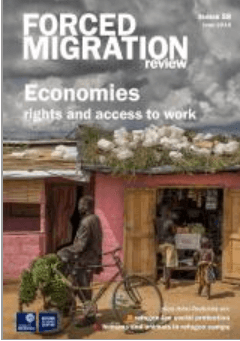In Colombia, guerrilla organizations, paramilitary groups, drug cartels, and local mafia and gangs have a dramatic impact on the markets, local economies, and livelihoods of displaced communities. Actors working on economic development with displaced populations have reported direct and indirect collaboration with these groups, on behalf of internally displaced persons (IDPs), impeding efforts to boost economic opportunities through income-generating activities and the pursuit of formal employment.
Through interviews with community leaders and NGO workers across Colombia, this study aimed to unpack how and why many displaced individuals collaborate with armed groups and criminal organizations.
Many are afraid… They feel like … the best thing that they can do is keep quiet. But there are others to whom this seems like the easiest life, especially given the abandonment by the State… they don’t have anyone to protect them, they don’t have anyone to hear them, or if someone hears them, they will be denounced [to the criminal groups].
Social worker outside of Medellin
The findings were multi-fold – from fear and intimidation, to economic incentives, to feelings of abandonment by the State and armed groups and organized criminal entities filling that void, to reactions to violence perpetrated against them by opposing parties.
If the paramilitaries expelled me, I become an enemy of the paramilitaries and close to the guerrillas. [Or] if the guerrillas were the ones who expelled me, and I am a displaced person and a victim, I end up being part of the paramilitary groups, in pursuit of a justice that the State has not been able to give, in pursuit of a reparation that the State has not been able to provide.
Interviewee
The multiplicity of factors at play encouraging displaced persons to collaborate with armed groups or criminal organization requires the engagement of actors across various sectors and disciplines to address the underlying issues and work in pursuit of economic (and protection) outcomes. The article concludes that as economic calculations are only one aspect of why IDPs may choose to support or assist criminal entities, therefore, efforts to disincentivize collaboration with criminal groups need to take account of other factors likely to be beyond the scope of a typical economic development organization, ultimately necessitating a Multi-Disciplinary approach.
Please read the full article HERE.
